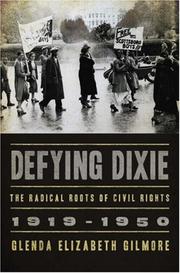| Listing 1 - 7 of 7 |
Sort by
|
Book
ISBN: 146965203X 1469651882 9798890857644 Year: 2019 Publisher: The University of North Carolina Press
Abstract | Keywords | Export | Availability | Bookmark
 Loading...
Loading...Choose an application
- Reference Manager
- EndNote
- RefWorks (Direct export to RefWorks)
This classic work helps recover the central role of black women in the political history of the Jim Crow era. Glenda Elizabeth Gilmore explores the pivotal and interconnected roles played by gender and race in North Carolina politics from the period immediately preceding the disfranchisement of black men in 1900 to the time black and white women gained the vote in 1920. Gilmore argues that while the ideology of white supremacy reordered Jim Crow society, a generation of educated black women nevertheless crafted an enduring tradition of political activism. In effect, these women served as diplomats to the white community after the disfranchisement of their husbands, brothers, and fathers. Gilmore also reveals how black women's feminism created opportunities to forge political ties with white women, helping to create a foundation for the emergence of southern progressivism. In addition, Gender and Jim Crow illuminates the manipulation of concepts of gender by white supremacists and shows how this rhetoric changed once women, black and white, gained the vote.
African American women --- African Americans --- African American women. --- Politics and government. --- Race relations. --- Political activity --- History. --- Suffrage --- Political activity. --- Suffrage. --- 1865-1950 --- North Carolina --- North Carolina. --- Politics and government

ISBN: 9780393062441 0393062449 Year: 2008 Publisher: New York London Norton
Abstract | Keywords | Export | Availability | Bookmark
 Loading...
Loading...Choose an application
- Reference Manager
- EndNote
- RefWorks (Direct export to RefWorks)
The civil rights movement that loomed over the 1950s and 1960s was the tip of an iceberg, the legal and political remnant of a broad, raucous, deeply American movement for social justice that flourished from the 1920s through the 1940s. This contentious mix of home-grown radicals, labor activists, newspaper editors, black workers, and intellectuals employed every strategy imaginable to take Dixie down, from a ludicrous attempt to organize black workers with a stage production of Pushkin - in Russian - to the courageous fight of striking workers against police and corporate violence in Gastonia in 1929. In a dramatic narrative [the author] shows how the movement unfolded against national and global developments, gaining focus and finally arriving at a narrow but effective legal strategy for securing desegregation and political rights. Little-known heroes abound in a book that will recast our understanding of the most important social movement in twentieth-century America
Social justice --- Southern States --- History --- 20th century --- Radicalism --- Civil rights movements --- African Americans --- Civil rights --- Politics and government --- 1865-1950 --- Social conditions --- Race relations --- Political activists --- Social movements --- Social reformers
Periodical
Year: 2005 Publisher: Philadelphia University of Pennsylvania Press
Abstract | Keywords | Export | Availability | Bookmark
 Loading...
Loading...Choose an application
- Reference Manager
- EndNote
- RefWorks (Direct export to RefWorks)
Book
ISBN: 9780393264463 0393264467 Year: 2016 Publisher: New York W.W. Norton & Company
Abstract | Keywords | Export | Availability | Bookmark
 Loading...
Loading...Choose an application
- Reference Manager
- EndNote
- RefWorks (Direct export to RefWorks)

ISBN: 0691001936 0691001928 069121624X Year: 2000 Publisher: Princeton, N.J. Oxford Princeton University Press
Abstract | Keywords | Export | Availability | Bookmark
 Loading...
Loading...Choose an application
- Reference Manager
- EndNote
- RefWorks (Direct export to RefWorks)
White supremacy shaped all aspects of post-Civil War southern life, yet its power was never complete or total. The form of segregation and subjection nicknamed Jim Crow constantly had to remake itself over time even as white southern politicians struggled to extend its grip. Here, some of the most innovative scholars of southern history question Jim Crow's sway, evolution, and methods over the course of a century. These essays bring to life the southern men and women--some heroic and decent, others mean and sinister, most a mixture of both--who supported and challenged Jim Crow, showing that white supremacy always had to prove its power. Jim Crow was always in motion, always adjusting to meet resistance and defiance by both African Americans and whites. Sometimes white supremacists responded with increased ferocity, sometimes with more subtle political and legal ploys. Jumpin' Jim Crow presents a clear picture of this complex negotiation. For example, even as some black and white women launched the strongest attacks on the system, other white women nurtured myths glorifying white supremacy. Even as elite whites blamed racial violence on poor whites, they used Jim Crow to dominate poor whites as well as blacks. Most important, the book portrays change over time, suggesting that Strom Thurmond is not a simple reincarnation of Ben Tillman and that Rosa Parks was not the first black woman to say no to Jim Crow. From a study of the segregation of household consumption to a fresh look at critical elections, from an examination of an unlikely antilynching campaign to an analysis of how miscegenation laws tried to sexualize black political power, these essays about specific southern times and places exemplify the latest trends in historical research. Its rich, accessible content makes Jumpin' Jim Crow an ideal undergraduate reader on American history, while its methodological innovations will be emulated by scholars of political history generally. In addition to the editors, the contributors are Edward L. Ayers, Elsa Barkley Brown, W. Fitzhugh Brundage, Laura F. Edwards, Kari Frederickson, David F. Godshalk, Grace Elizabeth Hale, Jacquelyn Dowd Hall, Stephen Kantrowitz, Nancy MacLean, Nell Irwin Painter, and Timothy B. Tyson.
African Americans --- Civil rights --- Southern States --- History --- Politics and government --- 1865 --- -Southern States --- Race relations --- Social conditions --- Sex role --- HISTORY / United States / General. --- History. --- Abernathy, Mary. --- Arkansas. --- Barnes, Mary. --- Butler, Matthew. --- Chamberlain, Daniel. --- Dare, Virginia. --- Douglass, Frederick. --- Edmonds, Richard. --- Edwards, Griffin. --- Forrester, Richard. --- Georgia. --- Hampton, Wade. --- Hinton, Mary Hilliard. --- Jews. --- Johnson, Andrew. --- Lebsock, Suzanne. --- Little Rock, Ark. --- Mahone, William. --- McFadden, Ida Caldwell. --- New Deal. --- North Carolina. --- Parker, John. --- Progressivism. --- South Carolina. --- anti-Semitism. --- black codes. --- child labor. --- consumption. --- federal intervention. --- general stores. --- ministers. --- patronage. --- racial terrorism. --- Gender role --- Sex (Psychology) --- Sex differences (Psychology) --- Social role --- Gender expression --- Sexism --- Afro-Americans --- Black Americans --- Colored people (United States) --- Negroes --- Africans --- Ethnology --- Blacks --- Black people --- Race relations. --- Social conditions. --- Gender roles --- Gendered role --- Gendered roles --- Role, Gender --- Role, Gendered --- Role, Sex --- Roles, Gender --- Roles, Gendered --- Roles, Sex --- Sex roles --- U.S. --- RACE RELATIONS --- POLITICS AND GOVERNMENT
Book

ISBN: 9780691216249 Year: 2020 Publisher: Princeton, NJ
Abstract | Keywords | Export | Availability | Bookmark
 Loading...
Loading...Choose an application
- Reference Manager
- EndNote
- RefWorks (Direct export to RefWorks)
Multi

ISBN: 9780691216249 Year: 2020 Publisher: Princeton, N.J. Princeton University Press
Abstract | Keywords | Export | Availability | Bookmark
 Loading...
Loading...Choose an application
- Reference Manager
- EndNote
- RefWorks (Direct export to RefWorks)
| Listing 1 - 7 of 7 |
Sort by
|

 Search
Search Feedback
Feedback About UniCat
About UniCat  Help
Help News
News